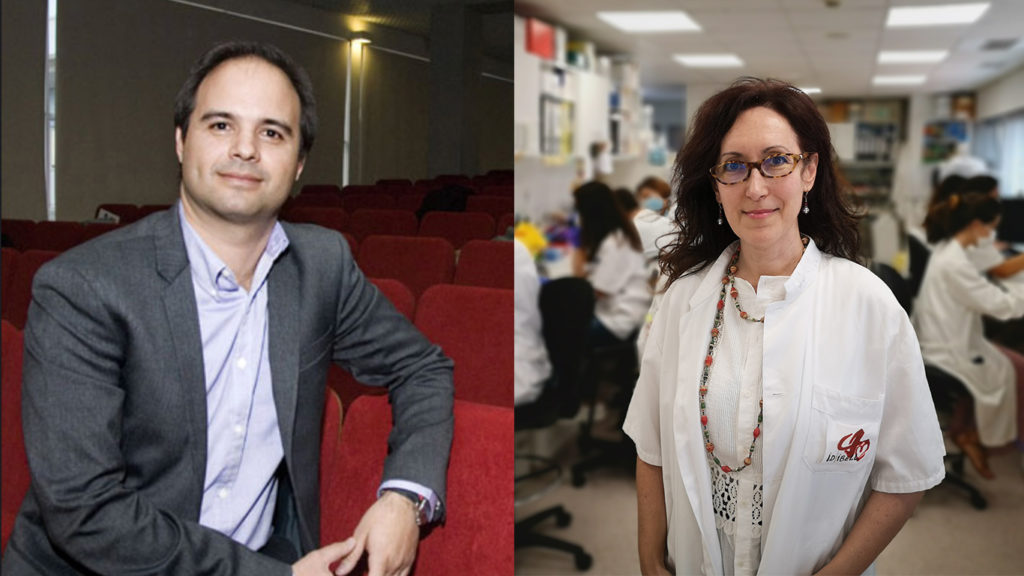Since the first case of pneumonia caused by SARS-CoV-2 was reported in Wuhan in December 2019, this virus has infected more than 79 million people and has been responsible for at least 1.7 million deaths over the world. Most of the patients infected by the new coronavirus do not present symptoms or these are mild, 3% develop pneumonia, and 0.3% progress to more severe conditions such as acute respiratory distress syndrome. However, the factors that determine the severity of the disease remain unknown, unraveling them could be determinant to improve treatment and prognosis of the disease.
Previous studies, with the participation of Dr. Aurora Pujol, geneticist and ICREA professor at the Bellvitge Biomedical Research Institute (IDIBELL), pointed out that the cytokine interferon type 1 could be playing a key role in the development of the most severe forms of COVID- 19. These studies showed that 10% of patients with severe forms of COVID-19 had developed their own antibodies against interferon. Furthermore, parallel studies demonstrated that mutations in the signaling pathway of this cytokine were also related to severe COVID-19.
Now a study of the IDIBELL’s Neurometabolic Diseases group, led by Dr. Aurora Pujol, and the Department of Internal Medicine of the Infanta Leonor University Hospital in Madrid, led by Dr. Jesús Troya, has confirmed that 10% of the patients admitted to this hospital with severe forms of COVID-19 presented autoantibodies against interferon. In addition, they have analyzed the clinical impact of autoantibodies presence and the treatment with exogenous interferon.
The study published in the Journal of Clinical Immunology, comments Dr. Pujol “not only confirms the prevalence of autoantibodies in a significant number of patients with a worse prognosis, but also correlates them with biochemical biomarkers already in clinical use, such as a decrease in lymphocytes number or increase in C-reactive protein, also, underline the predictive value of these antibodies against interferon”. These results suggest that the detection of autoantibodies against interferon on arrival at the hospital could be very useful to select those patients who probably develop hyperimmunity (cytokine storm) and will need UCI admission. Furthermore, the autoantibodies parameter could be useful to adapt the treatment administered to these patients, for example, by intensifying the administration of exogenous interferon.
Dr. Troya indicates “in the data collected we have observed a correlation between the presence of autoantibodies and an increased risk of death, however, these are results in a limited cohort of 47 patients and, It would be ideal increase the study with more patients”. “On the other hand, we have not seen that exogenous treatment with interferon has improved the prognosis of the patients, this may be because the group studied consisted of patients with very advanced disease. We propose to study the early administration of this cytokine in patients with autoantibodies against interferon in the early stages of the disease to determine its effectiveness”, comments Dr. Troya. The study was conducted in collaboration with the laboratory of Paul Bastard and Jean Laurent Casanova at Rockefeller University NYC/Imagine Institute in Paris.
Interferons are hormone-like signaling proteins that are essential in the body defense against viral infections. This type of immune response is even more important in the fight against the SARS-CoV-2 virus, since the virus itself has mechanisms to reduce the production of interferon by the cells of the immune system. Therefore, in people with these mutations, the effects would add up and the virus would go unnoticed by the body’s defenses.
The Bellvitge Biomedical Research Institute (IDIBELL) is a biomedical research center created in 2004. It is participated by the Bellvitge University Hospital and the Viladecans Hospital of the Catalan Institute of Health, the Catalan Institute of Oncology, the University of Barcelona and the City Council of L’Hospitalet de Llobregat.
IDIBELL is a member of the Campus of International Excellence of the University of Barcelona HUBc and is part of the CERCA institution of the Generalitat de Catalunya. In 2009 it became one of the first five Spanish research centers accredited as a health research institute by the Carlos III Health Institute. In addition, it is part of the “HR Excellence in Research” program of the European Union and is a member of EATRIS and REGIC. Since 2018, IDIBELL has been an Accredited Center of the AECC Scientific Foundation (FCAECC).

